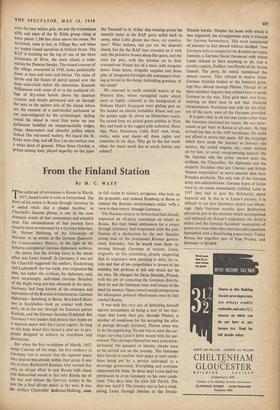From the Finland Station
By D. C. WATT THE outbreak of revolution in Russia in March, 1917, found Lenin in exile in Switzerland. The story of his return to Russia through Germany 'in a sealed truck like a plague bacillus,' in Churchill's famous phrase, is one of the most dramatic events of that momentous and eventful Year. The circumstances of that journey have recently been re-examined by a German historian, Dr. Werner Hahlweg, of the University of Munster, in an article in the German Quarterly for Contemporary History, in the light of the hitherto unexplored German diplomatic archives.
He shows that the driving force in the whole affair was Lenin himself. In Germany, it was not (as Churchill suggested) the soldiers, Hindenburg and Ludendorff, the war lords, who originated the Idea, but rather the civilians, the diplomats, and, most surprisingly, individual German Socialists of the Right-wing pro-war elements in the party. Germany had long known of the existence and aspirations of the Russian revolutionaries. German diplomats—Romberg in Berne, Brockdorff-Rant- zau in Stockholm—took up contact with them early on in the war through the Estonian patriot Keskula, and the German Socialist Helphand. But Germany's war leaders had pinned their hopes on a separate peace with the Czarist regime. So long as this hope lasted they turned a deaf ear to pro- posals designed to achieve its overthrow and destruction.
But when the first revolution of March, 1917, swept Czarism off the .stage, the first tendency in Germany was to assume that the separate peace they desired was already within their grasp. It was the civilian Brockdorff-Rantzau who warned that only an all-out effort to sow Russia with chaos and destruction would in fact take Russia out of the war and release the German armies in the east for a final all-out attaak in the west. It was the civilian Chancellor Bethman-Hollweg, soon to fall victim to military arrogance, who took up his proposals, and ordered Romberg in Berne to contact the Russian revolutionary exiles 'with a view to their return' through Germany.
The Russian emigres in Switzerland had already organised an all-party committee on return to Russia. But their initial enthusiasm for a return through Germany had evaporated with the pub- lication of a declaration by the new Socialist strong man of the provisional Russian govern- ment, Kerensky, that he would treat those re- turning through Germany as traitors. Lenin, originally on this committee already suspecting That its organisers were planning to delay his re- turn and that of his sympathisers in favour of his enemies, lost patience at this and struck out on his own. He charged the Swiss Socialist, _Platten, with the job of contacting the Germans directly. Both he and the Germans were well 'aware of the need for secrecy. Open contact would compromise his subsequent political effectiveness once he had reached Russia.
It was with this very aim of defending himself against accusations of_ being a tool of the Ger- mans that Lenin then put, through Platten, a number of conditions for his accepting the offer of passage through Germany. Platten alone was to do the negotiating. No one was to enter the car- riages carrying Lenin's party except with his per- mission. The carriages themselves were to be extra- territorial. No passport or identity checks were to be carried out on the journey. The Germans were forced to swallow their pique at such condi- tions being put by a private individual to a sovereign government. Everything and everyone clamoured for haste. In three days Lenin had his permission to cross Germany on his own condi- tions. Two days later his train left Zurich. The date was April 9. The journey was to last a week, taking Lenin through Sweden to the Swedo- Finnish border. Despite the haste with which it was organised, the arrangements were a triumph for German bureaucracy. This most sensational of journeys in fact passed without incident. Two Germans only accompanied the Russian carriages, Jannson, a German Social Democrat with whom Lenin refused to have anything to do, and a cavalry captain, Freiherr von Planitz of the Saxon Guards. The party, he noted, maintained the utmost reserve. They refused to receive either German Socialist leaders or the fraternal greet- ings they offered through Platten. Though all of them excellent linguists they refused even to speak German on the way. They paid their own fares, insisting on third class to suit their financial circumstances. Provisions and milk for the child- ren of the party were all the Germans provided.
It is quite clear in all this that Lenin rather than the Germans instituted his return. He was deter- mined to get back to Russia at all costs. He had arrived too late in the 1905 revolution. He could not afford to arrive late again. All the trappings which have made the journey so famous—the secrecy, the sealed wagons, etc.—were insisted on by him, to avoid compromising himself. On the German side the prime movers were the civilians, the Chancellor, the diplomats and the majority Socialists who saw Czarism and British 'finance imperialism' as worse enemies than their Prussian overlords. The only role of the German army was administrative. German hopes of Lenin were by no means immediately fulfilled. Later in 1917 they had to give the Bolsheviks secret financial aid. In this as in Lenin's journey, it is difficult to see how Germany reaped any advan- tage. Only fourteen months later Bolshevism played its part in the mutinies which accompanied and enforced the Kaiser's abdication, the Army's defeat and the German Socialists' assumption of power at a time when they Were forced to associate themselves with a humiliating peace treaty. Today Russia has engulfed part of East Prussia, and Germany is divided.


































 Previous page
Previous page